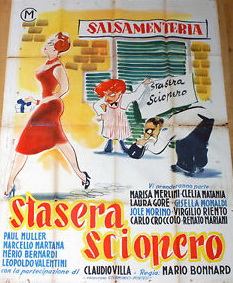
Stasera sciopero is a 1951 Italian comedy film directed by Mario Bonnard.

At Sword's Edge is a 1952 Italian swashbuckler film directed by Carlo Ludovico Bragaglia and starring Frank Latimore, Milly Vitale and Pierre Cressoy. It was shot at Cinecittà Studios in Rome. The film's sets were designed by the art directors Mario Chiari and Gianni Polidori.

Heart and Soul is a 1948 Italian drama film directed by Vittorio De Sica and Duilio Coletti, based on Edmondo de Amicis' novel Heart. De Sica won the Silver Ribbon for Best Actor by the Italian National Syndicate of Film Journalists.

The Countess of Castiglione is a 1942 Italian historical film directed by Flavio Calzavara and starring Doris Duranti, Andrea Checchi and Renato Cialente. The film portrays the life of the nineteenth-century Italian aristocrat Virginia Oldoini, Countess of Castiglione, best known as the lover of Napoleon III of France.
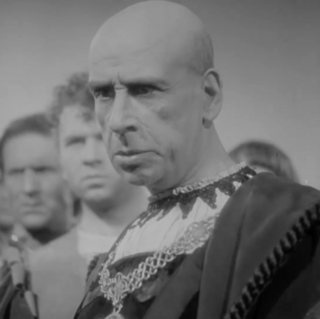
Lamberto Picasso was an Italian film actor. He appeared in 70 films between 1914 and 1953.

Giuseppe Verdi is a 1938 Italian biographical film directed by Carmine Gallone and starring Fosco Giachetti, Gaby Morlay and Germana Paolieri. The film portrays the life of the composer Giuseppe Verdi (1813-1901). The casting of Giachetti as Verdi was intended to emphasise the composer's patriotism, as he had recently played patriotic roles in films such as The White Squadron. The film was made at the Cinecittà Studios in Rome. The film is also known by the alternative title The Life of Giuseppe Verdi.

Department Store is a 1939 Italian "white-telephones" comedy film directed by Mario Camerini.
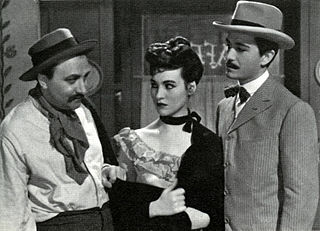
Il voto is a 1950 Italian melodrama film directed by Mario Bonnard. It is based upon the Salvatore Di Giacomo play.
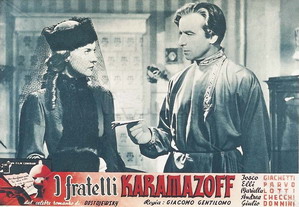
The Brothers Karamazov is a 1947 Italian historical drama film directed by Giacomo Gentilomo and starring Fosco Giachetti, Lamberto Picasso and Mariella Lotti. It is based on the 1880 novel of the same title by Fyodor Dostoyevsky. It won two Nastro d'Argento Awards, for best screenplay and for best score. The film's sets were designed by the art director Alberto Boccianti.

Under the Southern Cross is a 1938 Italian drama film directed by Guido Brignone and starring Antonio Centa, Doris Duranti and Enrico Glori. The film is set in Italian-occupied Abyssinia following the recent Italian victory there. It was one of a sequence of eight films set in Italy's African Empire during the Fascist era that were released between 1936 and 1939. The film is a propaganda piece designed to support Fascist policy on empire and concerns about inter-racial romances.
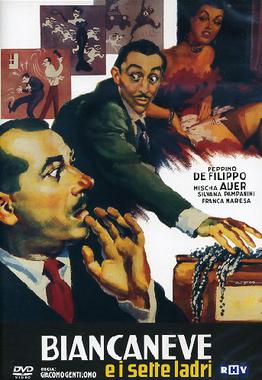
Snow White and the Seven Thieves is a 1949 Italian comedy film directed by Giacomo Gentilomo. It is loosely based on the novella Il ladro by Anton Germano Rossi.
Wealth Without a Future is a 1939 Italian drama film directed by Ferdinando Maria Poggioli and starring Lamberto Picasso, Paola Borboni and Doris Duranti. A wealthy industrialist retires to live in the countryside.

Esterina is a 1959 Italian drama film directed by Carlo Lizzani. It was entered into the main competition at the 20th Venice International Film Festival, in which Carla Gravina received a special mention for her performance.
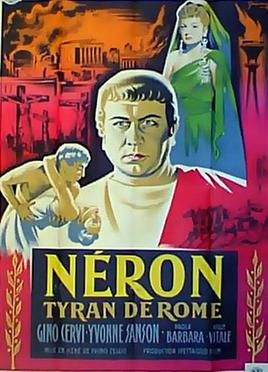
Nero and the Burning of Rome is a 1953 Italian epic historical drama film directed by Primo Zeglio and loosely based on real life events of Roman emperor Nero. It was based on the novel Nerone e Messalina (c.1949) by Harry Bluhmen.
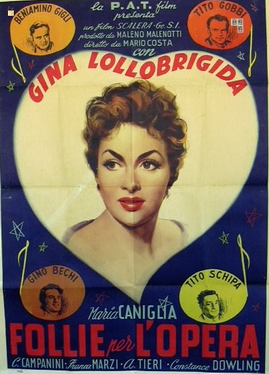
Mad About Opera is a 1948 Italian musical comedy film directed by Mario Costa and starring Gino Bechi, Gina Lollobrigida, and Carlo Campanini.
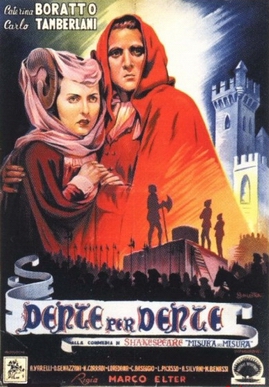
Measure for Measure is a 1943 Italian historical drama film directed by Marco Elter and starring Carlo Tamberlani, Caterina Boratto and Nelly Corradi. It is based on the William Shakespeare's play of the same name.
For Men Only is a 1938 Italian "white-telephones" comedy film directed by Guido Brignone and starring Antonio Gandusio, Carlo Buti and Paola Barbara.

Pazzo d'amore is a 1942 Italian comedy film directed by Giacomo Gentilomo and starring Renato Rascel.
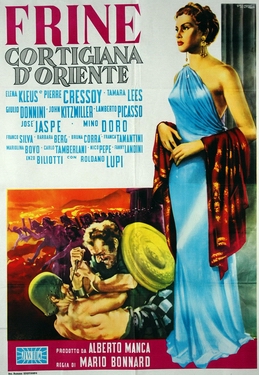
Frine, Courtesan of Orient is a 1953 Italian epic adventure film directed by Mario Bonnard and starring Elena Kleus and Pierre Cressoy. Sergio Leone served as assistant director.

The Dance of Time or more literally The Dance of the Clock Hands is a 1936 Italian sports comedy film directed by Mario Baffico and starring Marcello Spada, Ugo Ceseri and Luigi Almirante. It was one of only three films which the leading lady Barbara Monis appeared in.

















